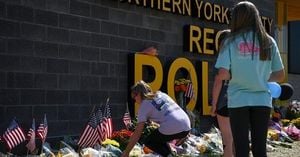A United States envoy is pushing for a ceasefire deal between Hezbollah and Israel as the humanitarian crisis intensifies following rampant looting of aid trucks within Gaza. Recently, armed gangs have become increasingly aggressive, leading to shortages of food and basic supplies for the already beleaguered population.
On his recent visit to Beirut, U.S. envoy Amos Hochstein confirmed progress on negotiations for the Israel-Hezbollah conflict, indicating hope for resolution. He reported having "very constructive talks" with Lebanese officials and expressed confidence, stating, "It is now within our grasp" to secure peace, though the situation remains dire within Gaza.
Meanwhile, the situation has rapidly deteriorated as vicious looting of humanitarian aid became rampant over the weekend. Almost 100 trucks filled with food and supplies were stolen, aggravifying the already severe food crisis impacting roughly 2.3 million individuals. Many have been displaced from their homes due to the violent conflict, and those living without access to the most basic necessities are suffering immensely.
Reports from the United Nations reveal the magnitude of the crisis, wherein prices for staple goods have skyrocketed, particularly flour, affecting families' ability to secure food. "I can’t even find basic goods, and prices are through the roof," lamented Nora Muhanna, who waited for hours to procure bread for her children.
The chaos emerged when armed men seized aid trucks near the Kerem Shalom crossing, designated by the Israeli military. Out of 109 trucks sent for aid distribution, the UN reported 97 were stolen, the largest loss of humanitarian aid during this war. UN officials are underlining the urgent need for accountability, criticizing all parties involved, particularly blaming Israel for enabling the crisis.
“The Israeli authorities continue to disregard their legal obligations under international law to assure the population's basic needs are met,” emphasized UNRWA, reflecting the frustrations stemming from the looting incidents. Amidst growing unrest, the UN has voiced its concerns about the potential for famine, with experts indicating shortages might already be reaching catastrophic levels.
Further complicity has emerged from Hamas's response to the looting. According to reports from Al-Aqsa TV, Hamas's security forces have initiated operations to suppress the thefts, resulting in twenty alleged looters' deaths during violent confrontations conducted on Monday. Hamas, alongside tribal groups, claims the actions are part of wider security measures to combat organized theft, which they see as exacerbated by international sanctions and siege impacts.
Eyewitness accounts described the operations as the first significant security crackdown since the war erupted. Residents have taken to the streets, calling for relief measures to stabilize prices and restore access to basic goods, with some taking drastic actions to fend for their families. They highlighted the despair spread across neighborhoods, as empty shops line the streets and the scent of baked goods fades from what used to be thriving markets.
“The situation is worsening daily; we are truly hungry,” said Mohammed Kamal, echoing sentiments felt by displaced families all around Gaza. Efforts to recover lost aid through negotiations are overshadowed by fears of violence and lawlessness among the armed gangs.
The looting has garnered international attention, drawing sharp criticisms from various humanitarian organizations and governments worldwide. The Biden administration's continued efforts to broker peace deal negotiations, reflected upon by Hochstein's recent visit, seem overshadowed by the humanitarian needs of the Gazan population. Their struggle extends beyond mere peace agreements as the people confront daily food and survival challenges.
The Palestinian authorities warn of dire consequences if the interference and violence surrounding aid distribution are not curbed immediately, claiming it affects their ability to address the humanitarian crisis effectively. The public is calling for urgent interventions not just for peace talks but for immediate food sustenance and humanitarian access.”



